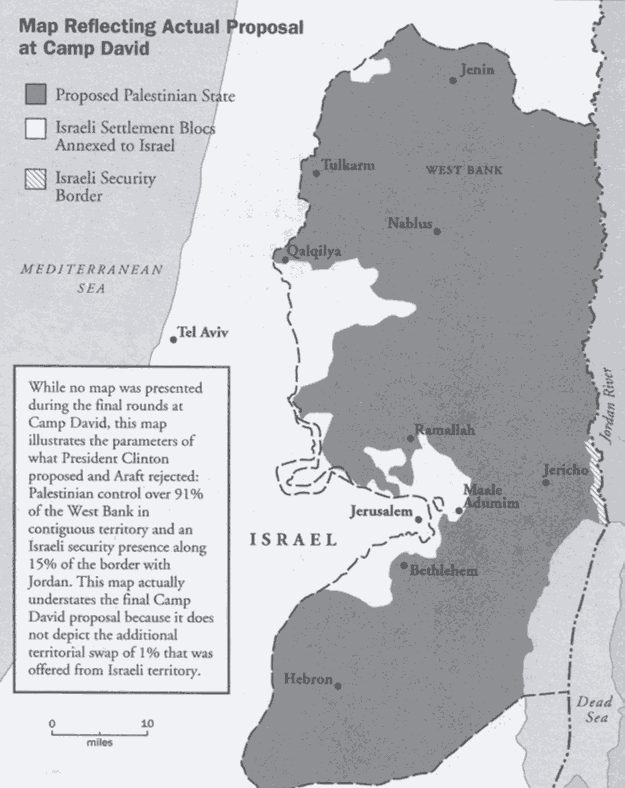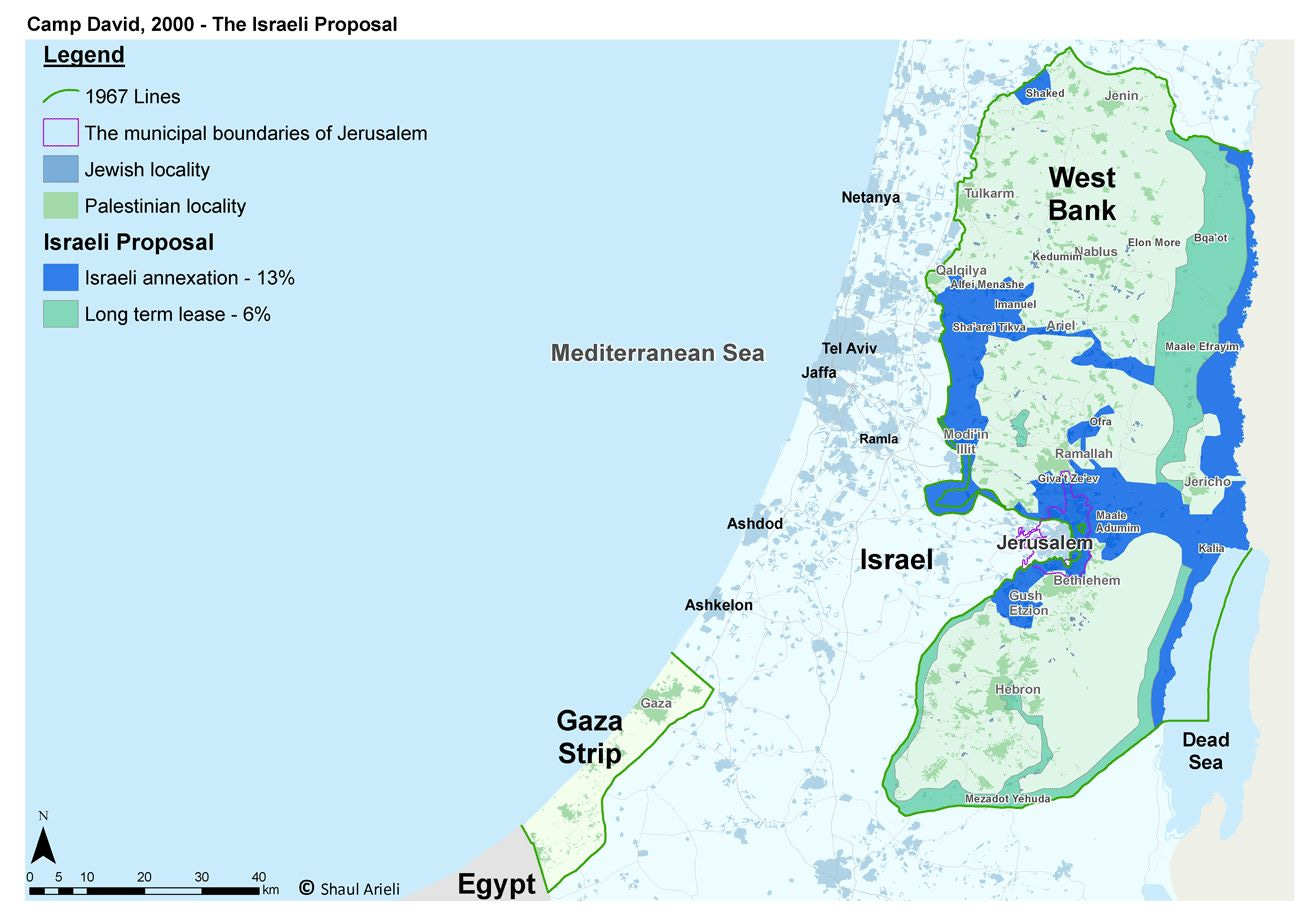No, The Camp David Proposal Didn't Cantonize The West Bank.
Did the Camp David deal break up Palestine into Cantons? No.
1 Introduction
A common talking point among those supportive of Israel is that Israel offered the Palestinians land for peace over and over again—in 48, 2000, 2001, 2008, and more! Most of the time, this claim is not thoroughly investigated—just claimed as if it’s established fact. Yet many of these claims are quite controversial. Here, I’ll analyze two specific claims about Camp David. Pro-Israel people blame Arafat, and pro-Palestinian people blame Barak and the Israelis. Various other views claim that answer is somewhere in the middle. I’ll investigate those in more detail in later articles—this is just about two specific relevant claims.
To be clear, my purpose in this article is to investigate two very specific claims: whether Arafat negotiated at Camp David and whether the Camp David proposal broke up the West Bank into cantons. I am not commenting on Israel’s wider war in Gaza or on who is broadly at fault in the conflict or what happened at Taba or anything else. My aim is quite narrow.
2 The Ross narrative
The pro-Israeli narrative is defended most eloquently by the quite brilliant Dennis Ross in his book The Missing Peace (he debated Chomsky and did, I think, much better than any of Chomsky’s other opponents—the debate was quite even). In an interview, as well as his book, Ross says at Camp David that Arafat didn’t negotiate or present new ideas—he just kept saying no. He claims it was Arafat who scuttled the Camp David offer—not Barak, and that Barak was willing to compromise and negotiate. This is consistent with an article by Benny Morris—quite a serious historian, as even many of his detractors admit—in which he interviewed Ehud Barak, the Israeli prime minister during the negotiations. The article was titled “Arafat didn't negotiate - he just kept saying no,” and involves the following summary:
The proposals included the establishment of a demilitarised Palestinian state on some 92% of the West Bank and 100% of the Gaza Strip, with some territorial compensation for the Palestinians from pre-1967 Israeli territory; the dismantling of most of the settlements and the concentration of the bulk of the settlers inside the 8% of the West Bank to be annexed by Israel; the establishment of the Palestinian capital in east Jerusalem, in which some Arab neighborhoods would become sovereign Palestinian territory and others would enjoy "functional autonomy"; Palestinian sovereignty over half the Old City of Jerusalem (the Muslim and Christian quarters) and "custodianship," though not sovereignty, over the Temple Mount; a return of refugees to the prospective Palestinian state though with no "right of return" to Israel proper; and the organisation by the international community of a massive aid programme to facilitate the refugees' rehabilitation.
Arafat said no. Enraged, Clinton banged on the table and said: "You are leading your people and the region to a catastrophe." A formal Palestinian rejection of the proposals reached the Americans the next day. The summit sputtered on for a few days more but to all intents and purposes it was over.
This is consistent with the claims of both Ross and Clinton about rejectionism. As Barak says “He did not negotiate in good faith; indeed, he did not negotiate at all. He just kept saying no to every offer, never making any counterproposals of his own.” Ross claims that this was the map offered:
This is also consistent with Clinton’s claims. Clinton famously, when called a great man by Arafat, said “I am not a great man. I am a failure, and you have made me one.” You can see, on Wikipedia, the different claims about the proposal. The Palestinians say that Arafat rightly turned down a rotten deal and have a variety of reasons why. Let’s explore them.
3 Cantons?
It’s often claimed that the deal at Camp David would have broken up the West Bank into cantons. Chomsky says:
Maps of the U.S.-Israel proposals at Camp David show a salient, east of Jerusalem, bisecting the West Bank, and a northern salient virtually dividing the northern from the central canton. I have the maps if you want them. The current map considerably extends these salients and the isolation of East Jerusalem. My maps are from the leading Israeli scholars, Ron Pundak, the Director of the Shimon Peres Center. The crucial issue at Camp David was territorial, not the refugee issue, for which Arafat agreed to a pragmatic solution, as Pundak, the leading scholar, reveals. No Palestinian could accept the cantonization, including the U.S. favorite, Mahmoud Abbas.
So Chomsky claims that the Camp David proposals would have broken up the West Bank into various disconnected islands, with Israeli territory breaking them apart. He’s not alone: Shaul Arieli proposes a map that bisects the west bank and claims it was the Camp David proposal:
Arieli claims that Barak falsely embellished the quality of the deal.
Barak himself said in a press interview at Camp David that he agreed to transfer between 90-91% of West Bank territory to the Palestinians and to a land swap of 1% within the Green Line.
I, unfortunately, was unable to track down the source for that claim, but would appreciate those who could find it. Another who makes a similar claim about cantons is Ron Pundak, a leading Israeli scholar who bases his projection on “Israeli and Palestinian sources”—here’s the map he presents:
Shlomo Ben-Ami, a leading Israeli negotiator, famously claimed “Camp David was not the missed opportunity for the Palestinians, and if I were a Palestinian I would have rejected Camp David, as well.”
My verdict: the final Camp David proposal probably did not have cantons and most likely the Palestinians did not make counterproposals. I’d say the odds it had cantons are 28% (that’s the odds I’d bet at). In addition, Arafat was probably consistently rejectionist at Camp David (I’d give that 60% odds). In regards to counterproposals, Ben-Ami says:
No. Camp David collapsed over the fact that they refused to get into the game. They refused to make a counterproposal. No one demanded that they give a positive response to that particular proposal of Clinton's. Contrary to all the nonsense spouted by the knights of the left, there was no ultimatum. What was being asked of the Palestinians was far more elementary: that they put forward, at least once, their own counterproposal. That they not just say all the time `That's not good enough' and wait for us to make more concessions. That's why the president sent [CIA director George] Tenet to Arafat that night - in order to tell him that it would be worth his while to think it over one more time and not give an answer until the morning. But Arafat couldn't take it anymore. He missed the applause of the masses in Gaza.
Ben-Ami is much more sympathetic to the Palestinian narrative and generally represents a more pro-Arafat view of the negotiations than is typical. For this reason, I take his claims seriously. When people who were in the room during negotiations break from their side, that’s something to take seriously.
The claim about Cantons is hard to believe. We have the consistent record of Ross, Clinton, and Barak. Furthermore, just as a logical matter, it’s hard to believe that Barak would offer such a rotten deal. Barak’s political career was sunk as soon as the peace process failed—he had every incentive to get a deal. So it’s hard to believe he’d never offer a half-reasonable deal, and then agree upon a consistent lie with Ross and Clinton. And Ben-Ami rejects the Canton claim, saying:
Question: Is this the origin of the Camp David formula for a territorial exchange: 9 percent of the territories in return for 1 percent of sovereign Israeli territory?
Answer: “That formulation was never crystallized in a binding document. But from the beginning of the second week at Camp David, it was in the air. It was our working assumption. And it was based on what Arafat had said. Not on some canton scheme of Israel’s, but on explicit remarks by Arafat. I remember that on the 17th, I went to Ehud’s cabin and I ran into Clinton, who was just coming out of the cabin, and he told me the same: that Arafat’s message is readiness for 8 percent with a token territorial swap in the Gaza Strip.”
The main evidence, therefore, favoring the Chomsky canton narrative is that it comes from the Pundak and Arieli maps. Yet I think these are quite a bit less trustworthy than the Ross maps. Ross was in the room—Pundak and Arieli were not. And though Pundak talked to people in the rooms, the first-hand accounts are a good deal (pun intended) more trustworthy.
Furthermore, the Israelis, unlike the Palestinians, were quick to accept the Clinton Parameters. The Clinton parameters didn’t break up the West Bank into cantons, so it’s hard to believe that the Israelis would offer a non-contiguous state but then be quick to accept the Clinton parameters.
Thus, it’s quite likely, based on first-hand testimony, incentives, and later facts, that Arafat was rejectionist, that he kept saying no, and that the Camp David deal didn’t break up the West Bank into Cantons.







It seems as though the entire issue reduces to whether we're more incline to trust (1) Barak, Clinton, and Ross, or (2) Pundak and Arieli. You say that Ross' account ought to be given greater weight since "Ross was in the room—Pundak and Arieli were not." But this is seems mistaken to me: the fact that Ross was involved in the negotiations on the US-Israeli side surely ought to make us *more* skeptical of his account, not less. The same applies to Barak and Clinton. If it seems as though I'm being unduly harsh, consider the matter from the other side: suppose somebody were to cite Arafat's account as evidence for the Israelis being at fault for the failure of Camp David. Would you take that seriously? If not, why take Barak, Clinton, and Ross seriously, especially when the best Israeli scholarship contradicts them? At the very least, this seems like a flimsy ground for stating authoritatively that "No, the Camp David proposal didn't cantonize the West Bank."
You also say that "the Israelis, unlike the Palestinians, were quick to accept the Clinton Parameters." But this seems inaccurate: Israel accepted the parameters with reservations on December 28, while Arafat accepted them with reservations on January 2. This was confirmed on January 3, when the White House stated that "both sides have now accepted the president's ideas with some reservations." The later claim that Arafat rejected the parameters (made in the "Honest Reporting" article that you cite) seems to be false, at least based on the other source that you cite (Wikipedia's article on the Clinton Parameters).